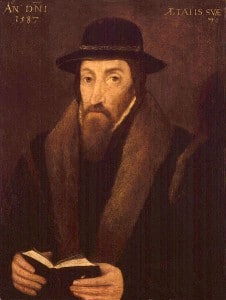 On this day in 1587, John Foxe, the English historian, reformer and martyrologist, died aged around seventy. He is known for his book Actes and Monuments, commonly known as Foxe’s Book of Martyrs, an account of Christian martyrs throughout history, with particular emphasis on the Protestant martyrs who died during the reign of Mary I.
On this day in 1587, John Foxe, the English historian, reformer and martyrologist, died aged around seventy. He is known for his book Actes and Monuments, commonly known as Foxe’s Book of Martyrs, an account of Christian martyrs throughout history, with particular emphasis on the Protestant martyrs who died during the reign of Mary I.
Foxe was also a lecturer of logic at Oxford University, and was a tutor to Thomas Lucy’s children and the orphaned children of Henry Howard, Earl of Surrey.
He was ordained as a deacon in 1550, but had to go into exile during Mary I’s reign, preaching in Frankfurt and then proofreading in Basel. He wrote his religious drama Christus Triumphans while in exile. Foxe returned to England in Elizabeth I’s reign, began work on Actes and Monuments and was also ordained as a priest. The first edition of Actes and Monuments was published by John Day 20th March 1563, and was around 1800 pages in length. It was hugely popular, and a second edition was published in 1570. Convocation, in 1571, ordered that a copy of it should be placed in every cathedral church, along with the Bishop’s Bible.
Foxe died while working on a Latin commentary of Revelation with his son, Samuel Foxe.
In he recorded Anne Boleyn’s execution and this is what he said of Anne:
“Certain this was, that for the rare and singular gifts of her mind, so well instructed, and given toward God, with such a fervent desire unto the truth and setting forth of sincere religion, joined with like gentleness, modesty, and pity toward all men, there have not many such queens before her borne the crown of England. Principally this one commendation she left behind her, that during her life, the religion of Christ most happily flourished, and had a right prosperous course.
Many things might be written more of the manifold virtues, and the quiet moderation of her mild nature, how lowly she would bear, not only to be admonished, but also of her own accord would require her chaplains plainly and freely to tell whatsoever they saw in her amiss. Also, how bountiful she was to the poor, passing not only the common example of other queens, but also the revenues almost of her estate; insomuch that the alms which she gave in three quarters of a year, in distribution, is summed to the number of fourteen or fifteen thousand pounds; besides the great piece of money which her grace intended to impart into four sundry quarters of the realm, as for a stock there to be employed to the behoof of poor artificers and occupiers. Again, what a zealous defender she was of Christ’s gospel all the world doth know, and her acts do and will declare to the world’s end.”
Notes and Sources
- The above bio of John Foxe is taken from On This Day in Tudor History by Claire Ridgway
- Foxe, John The Actes and Monuments of the Christian Church, VOL.6 The Reign of King Henry VIII. – Part I, p319-320. Available to read online at http://exclassics.com/foxe/foxe6pdf.pdf